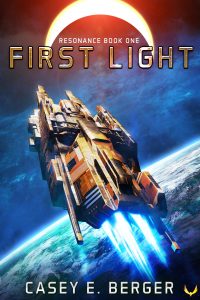Not all who Wander are Lost

Not all who wander are lost
If you followed the path of my career from where I am today back to my adolescence, you might ask yourself what disaster of a map I was looking at.
Today, I am a visiting professor of physics at a liberal arts college, as well as an author of speculative fiction. I started my education in physics nine years ago and spent a year as a postdoc before taking a faculty job, which is a fairly typical trajectory for someone in physics academia.
But before that, I was working in talent management in Hollywood. In my first college experience, I didn’t take a single math or physics class, and instead studied video production, philosophy, and Spanish. When I graduated, I moved out to Los Angeles and took a job at a talent management company. Absolutely none of those experiences was required (or even recommended) for pursuing my PhD in physics, and for most of my time in Hollywood, going back to school couldn’t have been farther from my mind, but eventually I did just that.
Were my years in the film production world wasted? A long, costly detour that put me back into my career trajectory far behind my peers?
I know it’s tempting to see it that way. We’ve been fed an idea of careers being direct paths, funneling us from grade school to college to the dream job in a neat, straight line. That’s the story we’re told, but if I’ve learned anything from my experiences as an author, it’s that we make deliberate choices in which parts of a story we tell, and the details we leave out are as important as the ones we put in.
What do you want to be when you grow up?
As a child, I could never decide on my answer to this question. It changed weekly, if not daily, and my curiosity has always been boundless. As an adult, I have a similarly difficult time answering. I’ve been asked if I would quit my day job if my books become successful enough to support me financially, and my answer is no. I know I don’t want to be only a writer, but I also know I don’t want to be only a physicist. So what does that make me? Chronically overworked? Perpetually distracted? A Schrödinger’s cat of career development who eventually will be forced to choose a state of either dead or alive in each job?
In our culture, specialization is the norm. We’ve been raised with the idea that people who can’t decide on one thing to do are flighty, uncommitted, and—worst of all—will never reach the pinnacle of their field. We teach young people about careers as if they are self-contained bubbles of work, with one door in and hundreds of doors out. Doors that lock permanently the moment you step outside.
When I was in high school, I felt a lot of pressure to design my extracurriculars with my career in mind: to land at the right college, in the right major, where I could get the right internships and then the right entry-level job. A straight path; an elevator up. Traditional careers are pitched as being for people whose interests are narrow, or who at least can confine their non-work interests to the small window of free time outside of work and sleep and the basic tasks required to live.
As a child, I loved science and math. I attended summer camps at the local science museum, I entered math competitions, I did logic puzzles for fun. I also read voraciously and started acting in summer Shakespeare camp and community theater in elementary school. I sang in a choir and painted and sketched and entered my photography in a big statewide art show. I started learning Spanish in pre-school, and in high school I added French to my repertoire and tried with middling success to teach myself Irish and Korean, just because it sounded fun.
And of course I wrote—short stories and the start of about ten different novels and my own film adaptations of my favorite books. I spent hours in the fantasy worlds in my head, where math and science and literature and languages didn’t have to be separated from each other like they were during the school day.
For years—in college and during the early days of my film career and my physics education—I told myself that the only way to be successful was to pick one thing and focus on it. To squeeze everything else I loved into tiny pockets of time and call them “hobbies.” But when I did that, I just wound up miserable, my work suffering as much as my mental health.
Embrace your range
About three years ago, I decided instead to embrace my wide-ranging interests. I had written a novel, but set it aside in order to not be “distracted” during grad school. But I missed writing, so eventually I pulled that novel out and started revising it. I deliberately incorporated time into my day for my writing, for practicing languages, for art and even daydreaming.
Did it require a lot more organization and project management skills to reintroduce this to my life and still maintain my research work? Absolutely. But it was worth it. Not only did I sell my novel (and sign a deal to write two sequels), I also found my passion in my day job and was able to more deliberately pursue a career at a liberal arts college.
Variety is good. Interests and passions are not distractions—they give us our unique gifts. Everyone has something special to bring to whatever task it is they’re working on, and we can learn important lessons from different projects, even when they seem like they have nothing in common.
I can use the problem solving skills I learned in physics to write a more believable science fiction story and tackle the long slow slog of drafting and revising, and I can use the nuance I’ve learned from writing to be able to communicate better with my colleagues and my students. Teaching is a form of storytelling, and I’ve found that understanding narrative can help me engage my students and show them why they should care about physics. I can use the time management skills I’ve learned from balancing all my interests to be more efficient and intentional with my time, which makes me happier no matter what I’m working on.
In the end, I am a better physicist because I write, and a better writer because I do science. Embrace your hobbies and your passions, even if there isn’t a neat shelf for them in your life. If they’re important to you, then you will find the space, and it will be worth it.
—
Casey E. Berger is the author of the forthcoming Resonance Saga (First Light, Ursa Major, Dark Stars, Aethon Books 2021), a space opera trilogy set in the distant future of the Milky Way galaxy. She earned a PhD in computational physics from UNC Chapel Hill and has bachelor’s degrees in philosophy and film production from Boston University and in physics from the Ohio State University. Since school is obviously her natural habitat, she now works as a professor of physics, where she studies the complicated interactions of subatomic particles and encourages the next generation of brilliant scientists. You can find more information about Casey at www.caseybergerbooks.com.
Follow her on Twitter at @CEBwrites and Instagram at @caseybergerbooks.
FIRST LIGHT
 She lost everything. Now, she’s fighting back.
She lost everything. Now, she’s fighting back.
When Jaya Mill’s parents were killed and her brother was kidnapped in an attack on her childhood home, she saw only one future for herself: enlist in the Union Starfleet and learn to defend herself.
Now, as a lieutenant commander aboard the UNS Avalon, Jaya and her elite counterterrorism unit enlist the help of Tynan Vasuda, an alien scientist from the Szacante Federation, to investigate the potentially sinister research of the new and mysteriously well-funded Sons of Priam.
Across the stars, a bounty hunter named Marantos accepts a high-paying assassination job in hopes of putting more distance between herself and her estranged royal family. But that job draws her straight into the web that the Sons of Priam are weaving to capture the highest office of the United Human Nations.
As Marantos claws free from the Sons of Priam, her path intersects with Jaya and Tynan, and she must decide whether to keep running from her past or turn and fight this new threat. And as Jaya pushes to uncover the identity of the shadowy figure at the helm of the Sons of Priam, she begins to reveal what truly happened the night she lost her family.
What Jaya discovers will challenge everything she knows…
Don’t miss the first book in a space opera thrill ride for the ages, filled with explosive action, characters that leap off the pages, and plenty of mystery. It’s perfect for fans of The Expanse and Mass Effect.
Category: How To and Tips
























